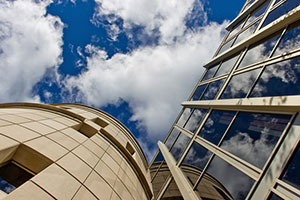Conference explores Laudato Si’ and sustainable development
Published: February 12, 2016 / Author: Carol Elliott

As part of the celebration of Pope Francis’ encyclical on the environment Laudato Si’, the University of Notre Dame is hosting a two-day conference to explore the significance of the encyclical, as well as the United Nations’ Sustainable Development Goals. (SDGs), key targeted environmental and developmental goals unanimously approved by world leaders in September.
The conference, “A Global Compact for Sustainable Development: Advancing Care for Our Common Home,” will take place April 3-4 on the Notre Dame campus. Some of the world’s leading experts in the area of sustainability and global development will present topics considered of critical importance to advancing the SDGs. The aim is to educate students about the role of business, to attract more companies to participate in the endeavor and to assist understanding of how Laudato Si’ shares a common mission with the effort.
Keynote speakers include Sir Mark Moody-Stuart, former CEO and chairman of Shell Oil and Gas Companies and current chair of the U.N. Global Compact Foundation, and Archbishop Bernardito Auza, permanent observer of the Holy See to the United Nations.

The event is sponsored by Notre Dame’s Center for Ethics and Religious Values in Business at Mendoza College of Business and the United Nations Global Compact, and is the business school’s contribution to the celebration of Laudato Si’ under the umbrella of the Keough School of Global Affairs.
“We all want to leave the world better than we found it,” said Rev. Oliver Williams, C.S.C., the director of the Center for Ethics and Religious Values in Business. “This conference will help us as businesses, organizations and as individuals shape a world better for ourselves and our families, as well as for the least advantaged.”
Among those presenting are Andrew Revkin, senior fellow of the Pace University Academy for Applied Environmental studies and writer for The New York Times; Daniel Bross, senior director of corporate responsibility for Microsoft; and Juergen Brokatzky-Geiger, global head of corporate responsibility for Novartis. Mark R. Kennedy, director and professor of political management at the George Washington University Graduate School of Political Management, also will present. Kennedy served three terms in the U.S. Congress and was a presidentially appointed trade adviser under presidents George Bush and Barack Obama.
Participating corporations include Microsoft, 3M and Sumitomo.
Registration and additional information for the event, which is open to the public, can be found at mendozaevents.nd.edu/Encyclical. Notre Dame students, faculty and staff members may attend the sessions free of charge, but should check the conference website for details regarding registration for meals.
Pope Francis’ encyclical Laudato Si’ (On Care for Our Common Home), released in June, offered an appeal to “every person living on this planet for an inclusive dialogue about how we are shaping the future of our planet.” The encyclical criticized consumerism and irresponsible development, and made a moral and religious argument for sustainable environmental practices on a global scale.
In September, 193 member states of the United Nations unanimously adopted the 17 Sustainable Development Goals, described as a “set of targets that address the most important economic, social and governance challenges of our time.” The SDGs are a part of the U.N. initiative “Transforming Our World: 2030 Agenda for Sustainable Development,” which lays out an action plan to eradicate poverty and strengthen universal peace through sustainable development by 2030.
The United Nations Global Compact has been designated by the U.N. as the official agency to coordinate and advance the business contribution to the SDGs. The U.N. Global Compact is a voluntary organization of more than 14,000 members, including 8,000-plus businesses in 150 countries, whose aim is to ensure that business activity adds value not just to the bottom line, but also to people, communities and the planet.




